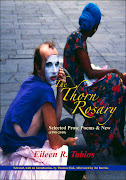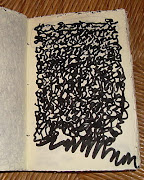
I am so grateful to Leny M. Strobel for her engagement with my book THE THORN ROSARY in the new issue of Moria Poetry! Here is an excerpt--though you can see entire review HERE:
Once upon a time the eyewitness to the rituals of a Babaylan (http://en.wikipedia.org/wiki/Babaylan; http://www.babaylan.net) told of her altered states of consciousness when she did her healing, her communing with the spirits. They didn’t understand her language but they accepted the efficacy of her relationship with the spirit world. They trusted her. They knew she had access to this world. (Why else did the Spanish friars in the 15th century embark on the project of exterminating these Babaylans?). [3]
Does a poet like Eileen also perform, symbolically, the role of a Babaylan? If the Babaylan is able to ferry a person in-between worlds, or is able to summon a wandering soul back to the body, or plead with the spirits to be kind and generous, or negotiate a propitiation—can a Babaylan-inspired poet do the same?
Sometimes reading poetry, for me, is learning how to dive for one’s own meaning. In diving one learns, senses, embodies. This I have learned from my engagement with Eileen’s body of work over the past decade. [4]
If according to Archbishop Fulton Sheen, The Rosary is “a meditation for the blind, the simple, the aged.” is it then possible that the The Thorn Rosary is that which pricks the meditation in order to return us to our own bodies? Our bodies that aren’t blind, not simple, not aged.
Isn’t this the work of babaylan poetics—to walk the angel back into its body in unborrowed light. Eileen creates her own light, a luminosity that is also sorrowful, joyful, glorious…the light is unborrowed because it has already taken upon itself all that there is—the world into the poem. It doesn’t ask for a return, only an invitation to dance. The dance of the babaylan.
Isn’t this what the babaylan does? She dances. In wholeness. In ecstasy. A body out of time and space. And when she doesn’t literally dance, she writes Poems that dance. The Poem, like this one, takes your hand and leads your sensuous mind, this mind that descends into the body to become whole and sacred:
Restive
—after “on God (en Garde)” by Archie Rand
The farmers are monitoring the sky. Rain dilutes sweetness in the grapes. Knuckles knot into themselves, mimic the knees of hundred-year-old grapevines. The cabernet hang like purple testicles. I am always fingering a bunch. Sometimes I pinch off a globe, split its skin before my lips and suck at its membrane. The farmers measure brix mathematically. I want my body to determine truth like Cezanne painted rocks instead of images. When I see the winged shadow glide over the fruit-laden fields of September’s wine country, I know better than to question how my body doubles over. How my mouth gasps. I feel blood flowing out of a creature, somewhere, felled on its path. Its last vision will be a vulture’s open beak. Sweetness, let the harvest begin under the most livid sun. “Sweetness” —perhaps I mean You, dear “God.” Lord, I am praying for life and living—I am making poems. (161)
Hail Mary, mother of Eileen. Blessed are we and blessed are the fruits of our wombs….
Thank you, Leny. I appreciate this Babaylan-ic perspective for reviewing my newest book. It's a unique gift!



1 comment:
What an etherel review I will
visit Moria and read all.
Post a Comment